| | |  | BY RENUKA RAYASAM | Presented by | 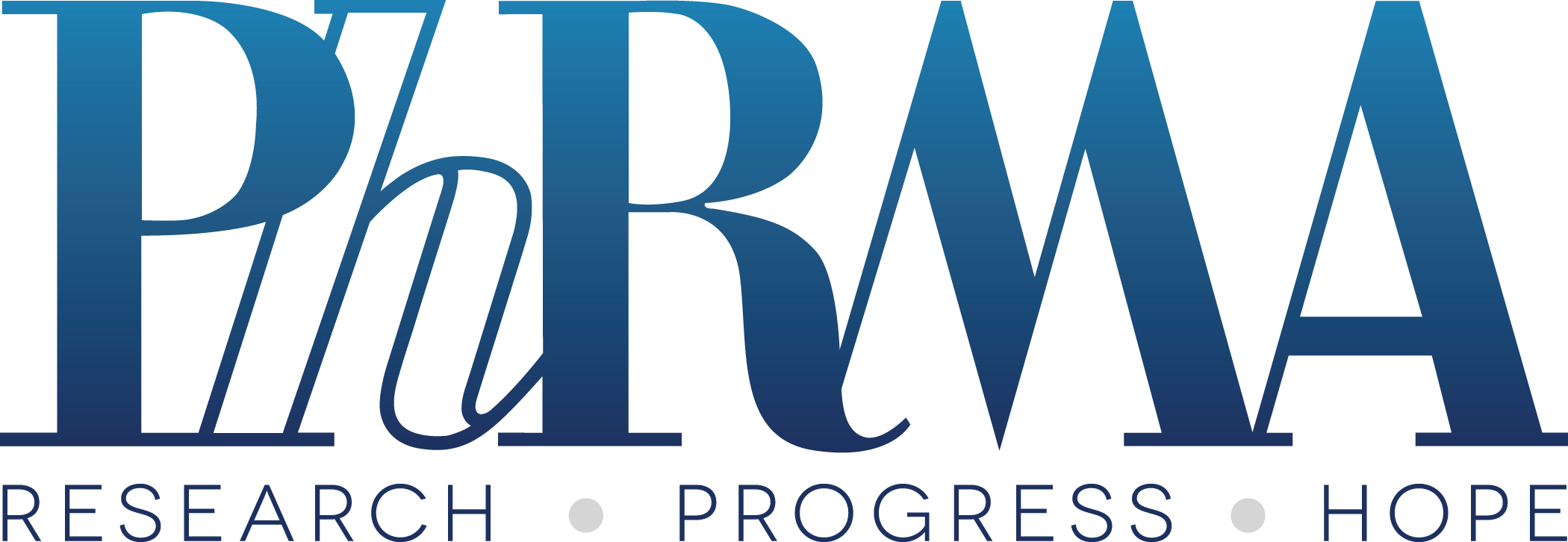 |
|
| With help from Myah Ward
| 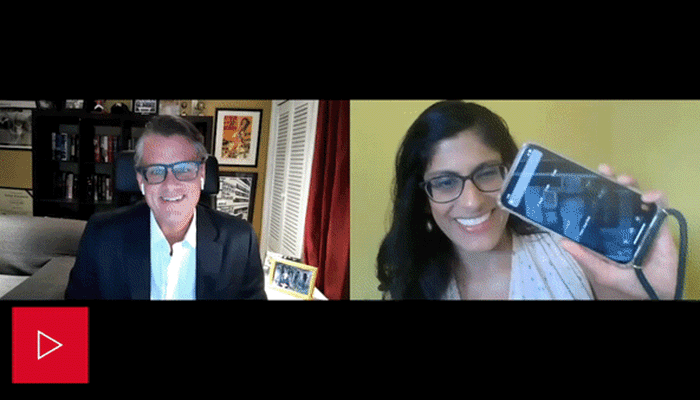
| THE GOOD, THE BAD AND THE UGLY — Congress is out. Talks over another stimulus package have collapsed. Covid shows no sign of disappearing. So where does that leave the economy this fall? Your host spoke with chief economic correspondent Ben White today about three possibilities between now and Election Day: The Goldilocks scenario: Under the best-case scenario, job gains continue, consumer spending increases, and business and school reopenings don’t lead to drastic Covid spikes. Additional stimulus is rendered unnecessary, and Trump could tout a historic economic rebound, even if it followed one of the worst GDP declines in the country’s history. The most likely scenario: As the stimulus money starts to dry up, the economy slows. More small businesses fail because they can’t get loans. The unemployment rate goes up, and consumers can’t spend. The doomsday scenario: Covid cases surge along with flu season, and hospitals get overwhelmed. Wall Street crashes when it sees the economy dip again. Jobless rates climb. People default on mortgages and other loans. It’s not likely, but not impossible, and definitely frightening. Watch to see Ben try to walk your host through all three scenarios in 3 minutes without cheating. Welcome to POLITICO Nightly: Coronavirus Special Edition. The National Zoo’s giant panda Mei Xiang could have a baby as soon as this weekend. Reach out rrayasam@politico.com or on Twitter at @renurayasam.
| |
| | A message from PhRMA: America’s biopharmaceutical companies are sharing their knowledge and resources more than ever before to speed up the development of new medicines to fight COVID-19. They’re working with doctors and hospitals on over 1,100 clinical trials. Because science is how we get back to normal. More. | | | | | THE HISTORY THAT WON’T HAPPEN — Is there any reason to mourn the absence of the traditional political convention? Will there be a single tear shed for the staged balloon drops, the roll calls with all the suspense of a Soviet Politburo vote, the voice-vote endorsement of a platform that the nominee will feel free to ignore? The obituaries for conventions have been written many times, and surely a lot of that old-fashioned folderol was going to end up consigned to history one way or the other. But there’s one convention feature that the parties are very much going to miss: the speech before a packed arena, with thousands shaking the rafters with their cheers, Jeff Greenfield writes in POLITICO Magazine. To a remarkable degree, convention oratory for a century and more — not just the content of speeches, but the way they connect with the crowd in the moment — has helped set the course of the party, often raising and lowering political fortunes in the process. And for all the telecommunication tools at hand, there is no obvious way for the parties to replace a political weapon that dates back to Demosthenes, the speech that stirs the listeners’ souls. Until now, however, there’s always been the possibility of the unexpected. With real, in-person conventions, we might have imagined a speech by Alexandria Ocasio-Cortez laying down the hopes — or demands — of an increasingly visible Left. We might have had a memorable offering by one of the defeated presidential hopefuls, or an “I told you so!” from Hillary Clinton. Someone at the Republican National Convention might have surprised the delegates with an appeal for a “kinder, gentler” version of Donald Trump before being jeered off the platform. This year, however, we are guaranteed no such moment. The parties, and the voters, will be the poorer for it.
| |
| | HAPPENING TUESDAY 1:30 p.m. EDT – A SPECIAL CONVENTION PLAYBOOK INTERVIEW WITH SPEAKER NANCY PELOSI SPONSORED BY AMERICAN INSTITUTE OF ARCHITECTS: A global pandemic. An economic crisis. Stalled negotiations on the latest Covid relief package. And a historic election amidst it all. Join POLITICO Playbook Co-authors Anna Palmer and Jake Sherman as the 2020 Democratic National Convention kicks off for a virtual interview with House Speaker Nancy Pelosi to get a behind-the-scenes look at what is happening on and off the stage. REGISTER HERE. | | | | | | | EMPTY SHELVES — Surgical gowns, gloves, masks, certain ventilators and various testing supplies needed to respond to the coronavirus pandemic are on the FDA's first-ever list of medical devices in shortage, health care reporter David Lim writes. The agency is not disclosing who makes any of the devices on the list, which it released today, because that “will adversely affect the public health by increasing the potential for hoarding or other disruptions.” Instead, the agency has released the product codes of devices in shortage. Increased demand for coronavirus testing has created shortages of sterile swabs needed for sample collection, materials used to transport samples and “general purpose reagents,” the agency said.
| 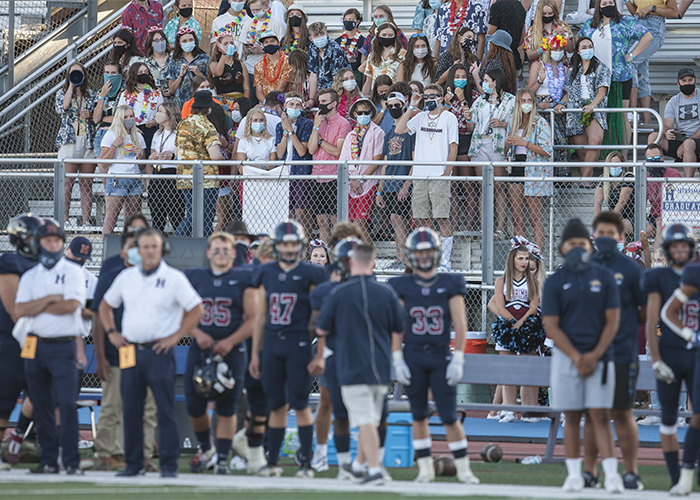
The masked student section cheers during the first half of a high school football game in Herriman, Utah — the first high school football game in the country this season since the spread of the coronavirus. | Chris Gardner/Getty Images | | | Nightly asked you: How has the pandemic changed your relationship to sports? Do you think it will permanently change how much you watch sports and attend live games when the pandemic ends? Below are some of your lightly edited responses. “I do think it's somewhat a permanent change as once you lose something, you don't always get the itch back. I'll still follow, just not as intently as even 10 years ago.” — Rich Klein, Yankees/Knicks/NY Giants fan, Plano, Texas “It has changed. I no longer view athletes as just objects for my entertainment. They are people and I am concerned about their health and wellbeing away from the arena of play more than I ever have been.” — Edward Washington, Arizona Cardinals/Kansas City Royals fan, Bronx, N.Y. “Although I enjoyed attending many major and local events for 20-plus years, I love no spectator golf on television. Who would miss the jerks yelling 'In the hole' at every 450-yard tee? Now you get to see the players up close, hear some of their strategy. I felt closer to Collin’s win on Sunday than standing in the crowd at the 2018 Masters.” — Susan Jaye Moran, PGA golf fan, South Orleans, Mass. “It has radically changed my life. I spent 20 years using the sports calendar to articulate the feeling of spring (baseball), the month of May (Indy 500) & the hint of fall (football). The social media chatter is different, the appreciation of games is different and even as baseball returns (minus the Cardinals) the banter on sports radio is appreciated for simply being there. I'll go to games. No idea when. That’s okay. For now.” — Matt Rodewald, Chicago Bears fan, Chicago, Ill. “I love sports. I am a huge fan and it is a rare weekend that my family and I (husband and 3 kids) are not attending a professional athletic event. We have not been in five months and miss it so much. My son almost cried in joy once sports were back on TV. But I can't imagine we go until next summer at best. And I'm devastated just thinking about that.” — Margie Yeager, Nationals/Wizards/Washington Football Team fan, Washington, D.C. “Not in the slightest. Haven't attended a professional sporting event since going to a Mets game in 1969. (That's right. More than fifty years ago.) The only time I pay attention to the local teams in sports-crazy Boston is when a home game means their fans will clog public transportation. The cancellation of sporting events, like the Boston Marathon, has been one of the few bright spots of this horrid year.” — Daniel M. Kimmel, not a fan, Somerville, Mass.
| |
“The pandemic has shifted sports from a 'need' to a 'want.' I'll continue to keep an eye on sports, but its role in life has diminished to where it should be — a fun diversion.” — KEVIN LYNCH, MICHIGAN STATE FAN, SHANGHAI, CHINA |
| “Not at all. I have never enjoyed watching sports. Further, I think people who do like sports should just get over it. I have had to give up the live events I enjoy — concerts, museums, lectures — due to the pandemic and I don't see why sports fans should not do exactly the same. Seeking special treatment for sports is a matter of greed.” — Laurie Larson, not a fan, Princeton, N.J. “As a lifelong, die-hard NY Mets fan, I look forward to every new season with great anticipation and excitement. I watch or attend most games. With the absence of spring training, I felt a definite void and never really got excited for the new season. All the changes simply robbed me of any urge to watch a game. To date, I haven’t watched a single game or even an inning. Never thought I’d say that.” — Rob Kaufman, NY Mets fan, New York, N.Y. “I have been a lifelong Chicago White Sox fan. I’m sad that my season tickets this year are collecting dust. This season I’m following every White Sox game on the radio and/or TV. I am in my seventies, so as soon as I have been vaccinated, I plan on being in my regular seats at the baseball park. I faithfully follow the White Sox, but do root for the Hawks. I’m a Southsider.” — Mary Anthony, Chicago White Sox fan, Darien, Ill. “I’ve been an avid consumer of sports my entire life (age 72). It feels like I’ve broken the addiction. I haven’t watched a single minute of the NBA bubble or any MLB games, and I’ve stopped watching the hucksters on ESPN. I think this is an opportunity to reset the entire sports world. Shut it down, fix it and then move on. I don’t miss sports or all the nonsense it produces.”— Vernon L. Hamilton, Oakland A’s/Raiders fan, Carson City, Nev. “Sports seems not at all important and at the same time more of a balm than it has ever been. I was delighted for baseball to return but since it has, I have yet to catch a game and am not enthusiastic about my fantasy baseball team. Canceling college football is likely the right play but I'll be desperately sad without it. Like so many things, sports during Covid primarily brings conflicting emotions.” — Autumn Hanline, Atlanta Braves/Tennessee Vols/Denver Broncos fan, Charlotte, N.C.
| |
| | 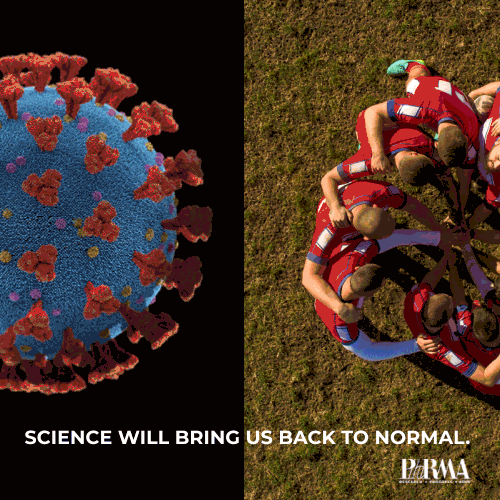 
| | |
| | THE WEEK THAT WAS — Executive producer Brooke Minters sits in for Matt Wuerker and looks at how political cartoonists and late-night TV hosts reacted to Joe Biden’s selection of Kamala Harris, on the latest edition of Punchlines.
| 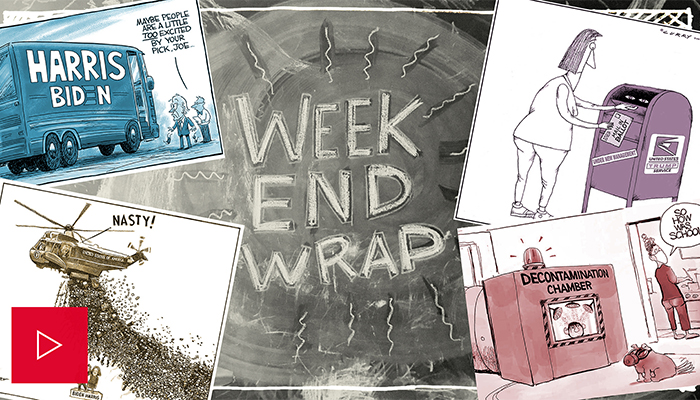
| | | | |
46 The number of states, along with the District of Columbia, that received United States Postal Service letters warning them that ballots may not arrive on time to be counted for the November election. |
| | |
| | HAPPENING THURSDAY - POWERING AMERICA’S ECONOMIC RECOVERY: The economy will be a driving factor in determining the outcome of the 2020 election. How is each party approaching the prolonged recovery? What are the differences that could tip the election in either direction? Join POLITICO chief economic correspondent Ben White for a virtual discussion on how the next administration, Trump or Biden, will approach economic and labor policies after November. REGISTER HERE. | | | | | | | TRAILBLAZER — Kamala Harris is the first female vice-presidential nominee of a major party not to stand teetering on the so-called ‘glass cliff’ confronting women leaders faced with almost impossible missions, deputy magazine editor and Women Rule host Elizabeth Ralph writes. In 1984, Walter Mondale lagged incumbent president Ronald Reagan 16 points in the polls when he decided to “shake things up,” as he later put it, by picking three-term New York congresswoman Geraldine Ferraro as his running mate. Ferraro — the first ever female VP nominee of a major party — gave Mondale an initial boost, but the pair crashed to defeat after a bruising campaign with just 13 electoral votes in November. In 2008, Senator John McCain had been consistently trailing newbie Senator Barack Obama when he chose little-known Alaska Governor Sarah Palin as his No. 2. It was a gambit, a “Hail Mary” pass, recalls Debbie Walsh, director of the Center for American Women and Politics — one that thudded to the ground on Election Day. Psychologists like to call this phenomenon the “glass cliff” — the idea that women are more likely to be elevated to executive leadership roles in periods of crisis, when they’re more likely to fail. But this time is different. Unlike Mondale and McCain, Joe Biden is leading Trump in the polls and has a decent chance of winning in November. His choice of Harris is not a desperate ploy to save a flailing campaign. And this time, no one is hoping for her to pull off an impossible salvage job. In fact, as historic as Harris is — she’s the first woman of color on a major party presidential ticket — Biden’s reasoning in picking her was fairly conventional.
| |
| | A message from PhRMA: America’s biopharmaceutical companies are sharing their knowledge and resources more than ever before to speed up the development of new medicines to fight COVID-19. They’re working with doctors and hospitals on over 1,100 clinical trials.
And there’s no slowing down. America’s biopharmaceutical companies will continue working day and night until they beat coronavirus. Because science is how we get back to normal.
See how biopharmaceutical companies are working together to get people what they need during this pandemic. | | | Did someone forward this email to you? Sign up here. | |
|
| | Follow us on Twitter | | | FOLLOW US
|
| |

No comments:
Post a Comment
Note: Only a member of this blog may post a comment.